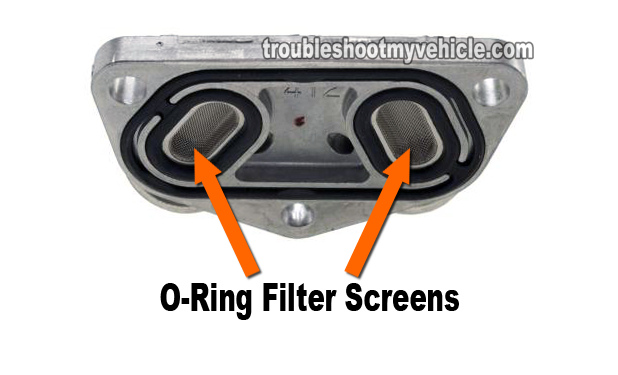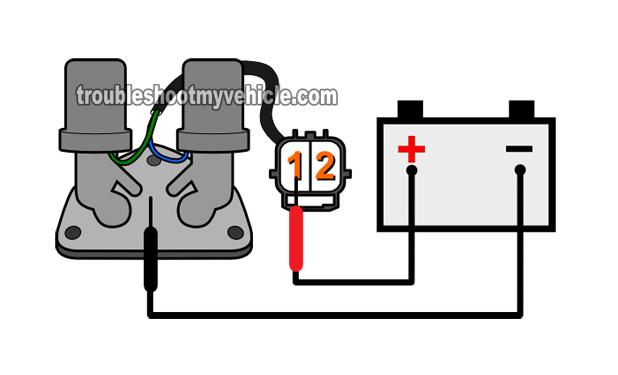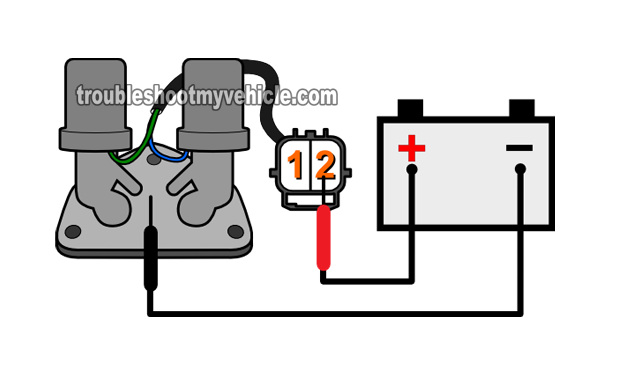TEST 2: Applying Battery Voltage To Solenoid A And B


There's a good chance that even though the internal resistance of each shift control solenoid is within specification, they're still defective.
To make absolutely sure that shift solenoid A and/or B are OK, we need to manually apply battery voltage from your Honda Civic's car battery and see if they make an audible clicking sound.
This is a pretty simple test, but requires that you take all necessary safety precautions when applying battery voltage with a jumper wire. My suggestion to you is to make a jumper wire with an inline fuse.
IMPORTANT: If you've removed the shift solenoid A and B assembly to test it, you'll need to do one of two things: Bolt it back in place (on the transmission's case). Or Ground the solenoid assembly to the engine (or battery negative post) with a battery jump cable (or this test won't work).
These are the test steps:
- 1
Unplug the shift control solenoid assembly from its electrical connector.
NOTE: This test is done on the shift control solenoid assembly's connector AND NOT on the engine wiring harness' pigtail connector. - 2
Apply 12 Volts to terminal #1 and then to terminal #2, of the shift control solenoid assembly's connector, using a fused jumper wire or a power probe.
- 3
You should hear an audible click when the 12 Volts are applied.
Repeat this test as many times as you need to be certain of your test results.
CASE 1: An audible click was heard when applying 12 Volts to each shift control solenoid. This test result tells you that the solenoid is opening and closing.
Unfortunately, this test result doesn't mean the solenoid is good. There's a chance that the solenoid is bad, even though it passed TEST 1 and this one (TEST 2). I have some suggestion that may help. For more details, go to: Solenoid Assembly Is Good But Transmission Still Not Shifting.
CASE 2: An audible click WAS NOT heard when applying 12 Volts to each shift control solenoid. This test result tells you that shift solenoid A and/or B is bad.
Since either solenoid belongs to the same assembly, you'll need to replace the entire assembly to solve the problem.
This test result also confirms diagnostic trouble codes P0753 and P0758 correctly indicating the shift solenoid assembly is defective.
Solenoid Assembly Is Good But Transmission Still Not Shifting

If you've tested and found both shift control solenoid A and B are good and your Honda Civic's automatic transmission IS NOT slipping yet a P0753, P0758, P0973, P0974, P0976, or a P0977 keeps popping up, I want to suggest two things:
- Remove the solenoid assembly's o-ring and clean the o-ring screens (see photo). There's a good chance they're clogged and restoring the fluid flow will solve the issue.
- Check the continuity of the wires between the solenoid assembly and the PCM and check for opens or shorts. You'll need a wiring diagram of your specific Honda Civic to accomplish this test.
Also, and especially after finding no faults in the wiring, there's a good chance that you'll have to replace the shift control solenoid A and B assembly to completely eliminate it as the source of the problem. I know this isn't something you want to hear, but in some cases this is a necessary thing.
Now, if your Honda Civic's transmission is slipping, then replacing the shift solenoid assembly isn't gonna' help bring the transmission back to normal. Slippage is a direct result of internal damage to the friction discs or hard parts. The only way to solve a slippage issue is overhauling the transmission.
More Honda Civic Test Tutorials
You can find a complete list of Honda Civic tutorials in this index: 1.7L Honda Civic Index Of Articles.
Here's a small sample of the tutorials you'll find in the index:
- How To Test The Crank Sensor (2001-2005 1.7L Honda Civic).
- Maintenance Required Light Reset (2001-05 1.7L Honda Civic).
- How To Do A Cylinder Balance Test (2001-2005 1.7L Honda).
- How To Test Trouble Code P0141 (2001-2005 Honda 1.7L).
- How To Test The TP Sensor (2001-2005 1.7L Honda Civic).
- How To Test Trouble Code P0135 (2001-2003 Honda 1.7L).

If this info saved the day, buy me a beer!




